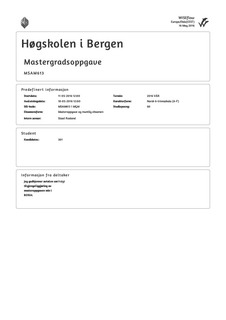«Om man ikke skal bruke tid på Holocaust, hva skal man bruke det på da?» Didaktisk potensiale i fortellingen om Holocaust og hvordan det blir ivaretatt i norsk skole
Master thesis
Permanent lenke
http://hdl.handle.net/11250/2481536Utgivelsesdato
2016-05-18Metadata
Vis full innførselSamlinger
Sammendrag
Denne oppgaven er en studie av hva som er det didaktiske potensialet i fortellingen om Holocaust, og hvordan det blir ivaretatt i den norske skolen. Dette er gjort ved analyse av lærebøker i historie og intervjuer av lærere på ungdomstrinnet. Analysene er gjort med bakgrunn i fortellingsteori og teoretiske diskusjoner om holocaustundervisning. Forskerne som har deltatt i denne diskusjonen, kan deles i to grupper: De som tror Holocaust kan lære elevene om holdninger og rasisme, og de som tror det finnes liten lærdom i denne fortellingen utenom dens historiske betydning. Jeg har konkludert med at innholdet i lærebøkene i stor grad er preget av vold og skrevet som tragedier. Det siste innebærer at fortellingene i bøkene får tydelig frem at Holocaust ikke var uunngåelig, samtidig som ingen klarte å stanse utviklingen på noe trinn i prosessen. De skyldige i dette var ifølge lærebøkene alle de som ikke agerte og arbeidet mot de nazistiske styresmaktene og overgriperne. Lærernes fortelling om Holocaust var overraskende ahistorisk og moraliserende. Lærerne var selv tydelige på at dette var et bevisst valg, mest fordi de mente at denne fortellingen har en etisk «merverdi», eller mer konkret: At elevene gjennom undervisningen om Holocaust kunne få inn gode holdninger til menneskeverd og ta avstand fra alle former for rasisme. Sett under ett er det tydelig at det fremste målet både for lærere og lærebokforfattere er at undervisningen om Holocaust fungerer slik at elevene blir «motstandsdyktige» og i stand til å hindre at noe lignende kan skje igjen. Denne ambisjonen er så pass førende at den synes å gå ut over undervisningen om Holocaust som en viktig historisk hendelse med både kortsikte og langsiktige årsaker og ettervirkninger. This thesis studies the didactical potential in the story of the Holocaust, and expose how this potential is maintained in Norwegian schools. This was done by studying textbooks in history for ninth grade, and by interviewing teachers. The analysis was done with narrative-theory and theoretical discussions on the Holocaust as a basis. Those writing on the subject can be divided into two groups: Those who believe the story of the Holocaust can teach students valuable lessons on racism and human dignity, and those who believe it holds no lessons beside its historical significance. I concluded that Norwegian textbooks are violent and have a tragic narration of the Holocaust. This means that the narrative underlines the fact that the Holocaust was not inevitable, but still no one was able to stop it from happening. Those responsible for that are the people who did not oppose the German regime. The teacher’s narrative was surprisingly a-historic and moralising. However this was a conscious choice. The teachers believed that the Holocaust held lessons on racism and human dignity, and that the main goal when teaching about the Holocaust was getting this message through. Both the textbooks and the teachers believed that the story of the Holocaust could make pupils able to stand up against racism and thus stopping anything like the Holocaust ever to happen again. This ambition was so important that it seemed to overthrow the idea of Holocaust as an historical event, with its historical causes and implications.
Beskrivelse
Masteroppgave i samfunnsfagdidaktikk

